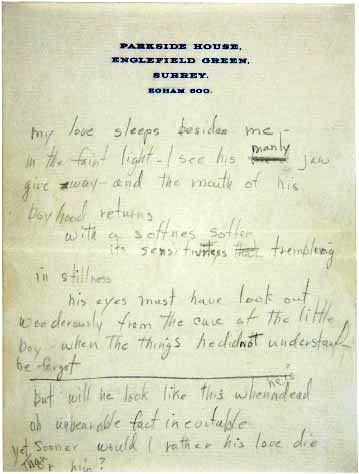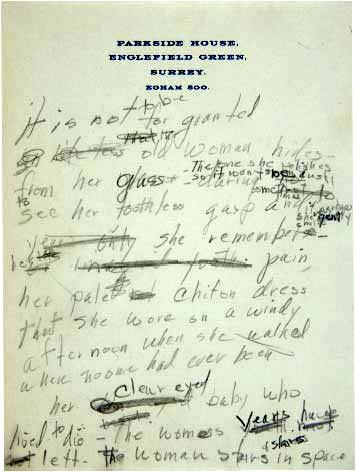Fragments: Poems, Intimate Notes, Letters (10 page)
Read Fragments: Poems, Intimate Notes, Letters Online
Authors: Marilyn Monroe
1956
Soon after their wedding on June 29, 1956, Marilyn and Arthur Miller went to London, where the film
The Prince and the Showgirl
, produced by Marilyn Monroe Productions, was to be shot. Laurence Olivier directed the film and played the male lead. The relationship between the two actors was difficult: Olivier was disdainful and haughty toward Marilyn. The couple arrived in London on July 14 and stayed at Parkside House, a luxurious manor house in Egham, Surrey, near London. Everything should have been idyllic. However, one day Marilyn found her husband’s open diary and discovered that the playwright was disappointed in her, that he was sometimes ashamed of her in front of his intellectual peers, and that he had doubts about their marriage. Marilyn was extremely upset and felt betrayed.
Did she write these few poems and odd texts on Parkside House stationery before or after her discovery? In either case, their tone is mournful. They are pessimistic about love and love’s possibilities as well as the inevitable passage of time. The filming was difficult. Marilyn’s acting coach Paula Strasberg was called in to help, as was Dr. Margaret Hohenberg, her New York analyst. On October 29, Marilyn Monroe was introduced to Queen Elizabeth II during a ceremony, and she went back to the United States on November 20. The portrait shown
here
is possibly of Laurence Olivier.

my love sleeps besides me—
in the faint light—I see his manly jaw
give away—and the mouth of his
boyhood returns
with a softness softer
its sensitiveness that trembling
in stillness
his eyes must have look out
wonderously from the cave of the little
boy—when the things he did not understand—
he forgot but will he look like this when he is dead
oh unbearable fact inevitable
yet sooner would I rather his love die
than/or him?



the pain of his longing when he looks
at another—
like an unfulfil
l
ment since the day
he was born.
And I in merciless pain
and with his pain of longing—
when he looks at and loves another
like an unfulfil
l
ment of since the day
he was born—
we must endure
I more sadly because I can feel no joy


oh silencewhy don’t/aren’t you still soothe me
yousounds drumsstillness hurt myearshead—and
pierce ears
jars my head with the stillness of
sounds unbearable/durable—
on the screen of pitch blackness
comes/reappears the shapes of monsterswho are
my most steadfast companions—
my blood is throbbing with unrest
turns it route inthe oppositeanother direction
and thewholeworld is sleeping
ah peace I need you—even a
peaceful monster.


Note: Wissett is a village in Suffolk. It is not known what the number refers to; possibly it is a phone number.

I guess I have always been
deeply terrified at to really be someone’s
wife
since I know from life
one cannot love another,
ever, really.

it is not to be for granted
in life less thatthe old woman hides—
from hermirrorglass—the one she polishes so it won’t be dusty—
daring sometimesthat to
to see her toothless gasp and if she perhaps very gently smiles
years onlyshe remembers—
herlife or imagined youthpain
her pale chif
f
on dress
that she wore on a windy
afternoon when she walked
where no one had ever been
herblue eyedclear eyed baby who
lived to die—the woman’syouthyears have
notleft. The woman
stares
&
stares
in space
